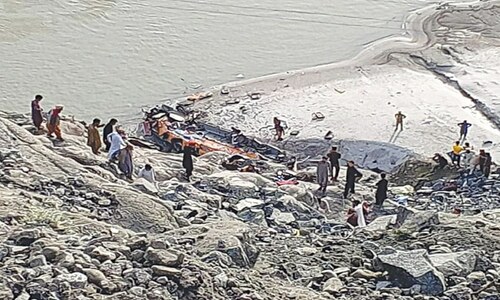ISLAMABAD, March 4: Pakistan has formally conveyed its decision to the United States that it will try Ahmed Omar Saeed Shaikh, the prime suspect in Daniel Pearl kidnapping case, sources in the interior ministry told Dawn.
“He would be tried in Pakistan according to the law of the land,” a senior official said.
During a meeting with US Ambassador Wendy Chamberlin, President Gen Pervez Musharraf had also conveyed the Pakistan’s decision in the matter, sources said.
Officials said that Omar Shaikh might be handed over to the US only after the criminal investigations were completed and the requirements of the due process of law met.
Sources said that the US had first requested for Omar Shaikh’s extradition in November 2001, in connection with some kidnappings committed in India in 1994. The request was made in a letter sent to the foreign office and followed up during a meeting between the US ambassador and President Musharraf on Jan 24, the day when the American reporter was kidnapped.
Sources said the US officials had agreed that Pakistan would bring Omar Shaikh to justice through its own legal system.
“Pakistan is a sovereign state. They have their own laws. A crime, a murder has been committed in their country and they have their own ways and laws of dealing with it,” officials said quoting a statement by the White House.
Omar Shaikh’s arrest was announced by the government on Feb 12. Later, in a statement before the court, the prime suspect deposed that he had surrendered to “non-police officials” on Feb 5.
Meanwhile, a feeling of pessimistic skepticism is creeping in the law enforcement officials about the recovery of Pearl’s body.
Asked about the progress in the case, officials in the interior ministry said, “the chances for the recovery of the body are slim.” An official, requesting anonymity, said that keeping in view the modus operandi of the terrorists they would not have taken the trouble of burying the body. Either the body had been thrown into the water or it might have been decomposed beyond recognition by now, the official said.
However, he said, efforts were continuing to recover the body and arrest Omar Shaikh’s accomplices.
In reply to questions about the impact on the prosecution case in the absence of the body, officials said the government was optimistic to get a conviction based on circumstantial evidence.
However, legal circles are of the opinion that non-recovery of the body would weaken the prosecution case. “More concrete evidence has to be provided by the police to get a conviction against Omar Shaikh for the murder of Daniel Pearl,” a lawyer said.
Experts said that a confession under oath or strong evidence, or recovery of the body at the least would be necessary to get the conviction.
However, sources close to the investigation said that Omar Shaikh was unwilling to make a confession under oath.
Amjad Hussain Farooqi, the murder suspect and his three “Arab” accomplices, are yet to be caught, an official said.
Sources feared the Arab suspects might have slipped through the porous borders.














































Dear visitor, the comments section is undergoing an overhaul and will return soon.